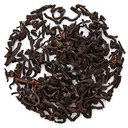Tea: Organic Silken Pu-erh
A Pu-erh Tea from DAVIDsTEA - ![]() Organic
Organic
| Brand: | DAVIDsTEA |
| Style: | Pu-erh Tea |
| Region: | Yunnan, China |
| Caffeine: | Caffeinated |
| Loose? | Loose |
| # Ratings: | 1 View All |
| Product page: | Organic Silken Pu-erh |
Reviewer: Whiskey

✓ 45 teas reviewed
✓ 6 of Pu-erh Tea
✓ 9 of Dark Tea
✓ 2 of DAVIDsTEA
✓ 6 from Yunnan, China
✓ 13 from China
Review of Organic Silken Pu-erh
July 8th, 2018
| Aroma | Flavor | Value | Total |
| 9 of 10 | 4 of 5 | 3 of 5 | 90 of 100 |
| Superb | Good | Reasonable |
I was in the area, so I decided to check out a David's Tea shop. In all honesty, it looked more like a candy store than a tea shop. It had all these colorful spoons and containers and most of their "teas" looked more like trail mix or confetti than tea (some of them had the ingredients to trail mix in them). I'd written down the handful of pure teas they offered before going to the store and this was one that I decided to buy some of.
The aroma was so much like bourbon vanilla that I checked the ingredients list both at the store and online. Indeed, tea was the only ingredient, but the scent was really impressive. There was a muted pu-erh note to this, overall. I brewed it about six times before anything even remotely 'fermented' came out and even then, it was a sweet mushroomy note, not musty or like basement water like some of the more rugged pu-erh. The notes overall were: bourbon vanilla, sweet wet wood, wet wood, cacao (but hardly any of the bitterness which usually coincides with this note), and a sweet mushroomy note after letting the wet leaves sit in the gaiwan overnight and brewing them again in the morning.
The effect was strong, very even and pleasing. In that respect, this was like a really good wine — the kind I'd get as a treat for myself and have with chocolate or a bath and a good book.
Compared to one of the most smooth, expensive ripened pu-erh teas I have, this is more expensive per gram. But, I was really impressed with this one, so I feel like it's worth it.
Unfortunately, David's Tea gave vague and unhelpful directions for brewing. I ended up creating my own guidelines, based on directions I had for a comparable tea. They turned out well, so I'm going to share them here:
Temperature: 100ºC
Tea: 7g
Water: 110ml (I used a 130ml gaiwan which worked well)
Times: rinse (5s), 5s, 10s, 10s, 15s, 20s, 30s, 60s...
(It's important to keep the first times brief as the tea has very small pieces and brews quickly, particularly at first.)
I'm curious to see how reliable its taste and effect will be. Sometimes, I've had very good, expensive ripened pu-erh brew well on certain occasions but not on others, even though I was using the same directions. I consider consistency to be a huge selling point because I like to know that I can count on a good brewing experience later. When I brew the tea again, I'll include some notes on whether it maintained the same effect or not and will adjust my rating accordingly.
For now, I'd definitely recommend this one. It seems particularly good for beginners just getting started with pu-erh because it doesn't have any 'off' notes. That said, it could give a beginner a wrongful impression of pu-erh because it lacks some of the more classic notes that pu-erh is known for (particularly the more earthy and fermented notes). So, by all means, enjoy it. Even use it as an introduction to pu-erh if you like. But, don't think for a moment that this is what all pu-erh tea tastes like. Out of fifty or so ripened pu-erh I've tried, maybe four of them were this smooth in effect, and out of those four, only two had such clean notes.


